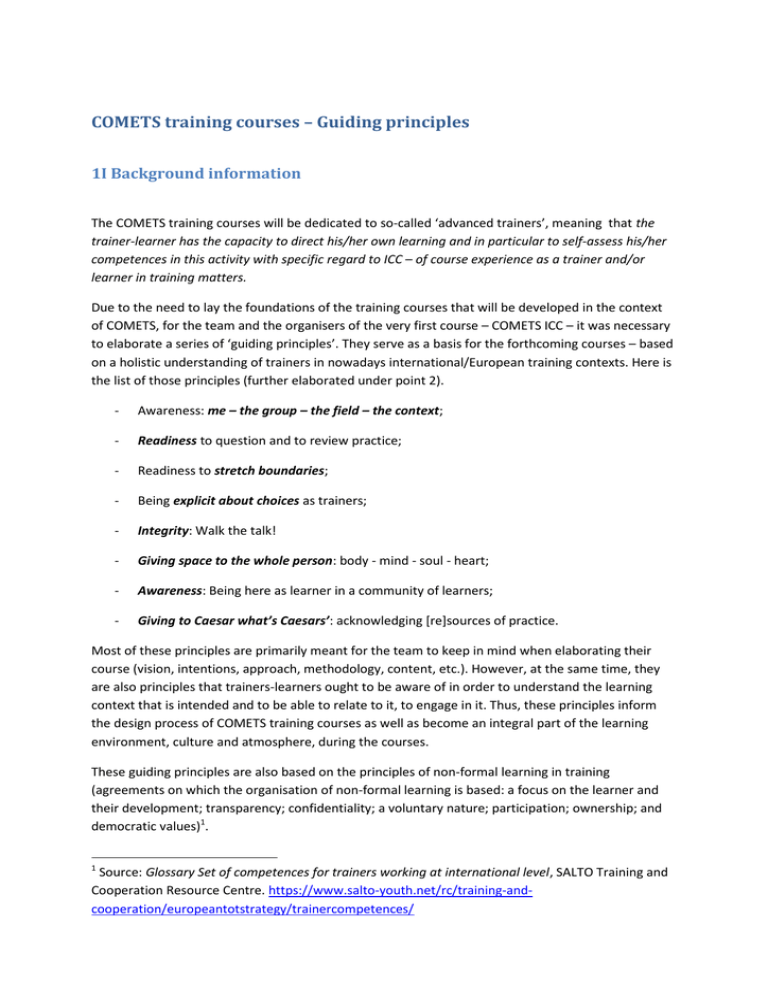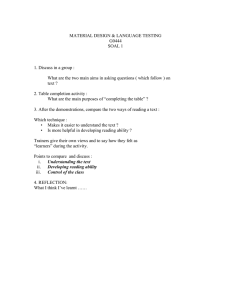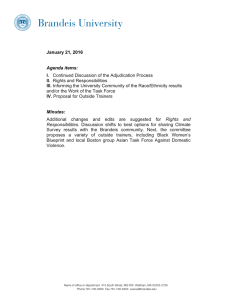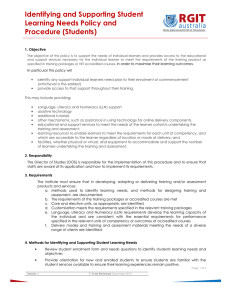COMETS training courses – Guiding principles
advertisement

COMETS training courses – Guiding principles 1I Background information The COMETS training courses will be dedicated to so-called ‘advanced trainers’, meaning that the trainer-learner has the capacity to direct his/her own learning and in particular to self-assess his/her competences in this activity with specific regard to ICC – of course experience as a trainer and/or learner in training matters. Due to the need to lay the foundations of the training courses that will be developed in the context of COMETS, for the team and the organisers of the very first course – COMETS ICC – it was necessary to elaborate a series of ‘guiding principles’. They serve as a basis for the forthcoming courses – based on a holistic understanding of trainers in nowadays international/European training contexts. Here is the list of those principles (further elaborated under point 2). - Awareness: me – the group – the field – the context; - Readiness to question and to review practice; - Readiness to stretch boundaries; - Being explicit about choices as trainers; - Integrity: Walk the talk! - Giving space to the whole person: body - mind - soul - heart; - Awareness: Being here as learner in a community of learners; - Giving to Caesar what’s Caesars’: acknowledging [re]sources of practice. Most of these principles are primarily meant for the team to keep in mind when elaborating their course (vision, intentions, approach, methodology, content, etc.). However, at the same time, they are also principles that trainers-learners ought to be aware of in order to understand the learning context that is intended and to be able to relate to it, to engage in it. Thus, these principles inform the design process of COMETS training courses as well as become an integral part of the learning environment, culture and atmosphere, during the courses. These guiding principles are also based on the principles of non-formal learning in training (agreements on which the organisation of non‐formal learning is based: a focus on the learner and their development; transparency; confidentiality; a voluntary nature; participation; ownership; and democratic values)1. 1 Source: Glossary Set of competences for trainers working at international level, SALTO Training and Cooperation Resource Centre. https://www.salto-youth.net/rc/training-andcooperation/europeantotstrategy/trainercompetences/ 2I Guiding principles explored Awareness: me – the group – the field – the context The COMETS training courses are not only about the learner’s personal development process; each individual works with and in a group. That group – and all individuals in it – work in the youth field and a given context. As trainers and as learners we have to be very much aware of this within our training processes for it defines the ‘wholeness’ of our work (what we do, why we do it, how we do it, and what the impact is). As learners, we also have to be ready to work on the follow-up of the course, ready to take action, ready for the next step. It doesn’t stop the last day of the course. Readiness to question and to review practice COMETS training courses address advanced trainers. Part of what defines ‘advanced’ is the capacity to reflect on the practice as trainer with regard to a given topic. It is the capacity to question, to review such practice, to live with the ambiguity of ‘many truths’ (even though this might be particularly linked to or relevant in a TC focusing on Intercultural Competence) and underlying attitudes and assumptions. Readiness to stretch boundaries COMETS training courses intend to be training courses where there is a learning atmosphere enabling everyone to stretch their boundaries, to be ready to challenge their comfort zone, to go beyond what is sure and to simply accept uncertainty, the unknown. Almost naturally, it strongly relates to the guiding principle above for it is also about embracing ambiguity as a potential source of learning. As this doesn’t happen by itself – human beings have a natural (and understandable) tendency to resist ‘insecurity’ at first, the team of trainers ought to work on creating a space, an atmosphere where everyone can feel secure enough to ‘try out’ and to live different experiences. This implies not only creating the physical space, but also to work, from the very beginning onward, with the dimension of trust. Being explicit about choices as trainers The team of trainers should be ready and able to explain why they opt for a given approach, method, theory, etc.). This particularly relates to the principle of ‘transparency’ but also to the very nature of passing on certain ‘knowledge’, even though ‘that way’ is not the only one, not the only truth. Many of these guiding principles are not about right or wrong – but about being able to share and explain choices and being able to reflect upon them (contrast them). Integrity: Walk the talk! ‘The true test of a man’s character is what he does when no one is watching’ said amongst others (apparently) H. Jackson Brown. And indeed, this is what integrity is about. It relates to the capacity to be honest with one selves, true to what one ‘preaches’, to be ‘whole’, to be ethical, consistent, trustworthy, etc. Integrity in training is also about the readiness to regularly check own values, look ‘inside’ and ask oneself: ‘is my practice in line with my values’? Apart from the individual trainer level integrity is also part of the approach – in form of dialogue and reflection about principles and values and how it influences actions as trainers (and beyond). Giving space to the whole person: body – mind - soul - heart Being engaged in COMETS training courses will never only be in the role of trainers (or trainerslearners for that matter) but as whole persons. The trainer team undoubtedly have an interdependent relation with the group (and the context) but also with oneself. For participants to engage wholeheartedly and wholly, the team of trainers will aim to find an appropriate way to respond to the necessity to care for the body, the mind, the soul and the heart. Balance and harmony can favourably support learning, which doesn’t mean that frustration and/or strong emotions in general are to be banned. On the opposite: the point here is to give space to all dimensions on the person to express themselves, in a given moment, situation, or context, and to keep in mind that none of them are isolated aspects. Awareness: I am here as learner in a community of learners The group is composed of individuals who are all trainers - In different ways, in different contexts, working on different topics perhaps, but trainers anyway. Yet, COMETS training courses want to look at the group of participants first as learners and then as trainers. This implies that participants themselves have to primarily engage in the process in the shoes of learners and not [only] of trainers. Everybody who experimented attending training for trainers (as participants) has probably faced the challenge of ‘letting it go’, of the need to ‘silence’ for a little while to rather open ourselves to learning. Easier said than done, surely, but indispensable to ensure giving a fair and equal space to everyone. Giving to Caesar what’s Caesars’: acknowledging [re]sources of our practice Too often training courses – or training sessions – are observed and developed based on theories and methods that the team knows, has tested, and practiced, but not necessarily knowing the very sources of what is being shared and done. The use of the iceberg in intercultural learning is one of the best examples to illustrate this: how many know where it is initially coming from? And yet it remains widely used (though now contested as the work on ICC evolves). Hence and even if a method is mastered, teams of trainers ought to research on the theory behind work; trainers must be able to provide the group with the source of the knowledge applied. This will not only about having a just and fair approach to work – acknowledging what and where what was said and used comes from – but will also allow to grow, challenge, question and adjust practice. February 2015





